八年级下英语语法
- 格式:doc
- 大小:108.00 KB
- 文档页数:11
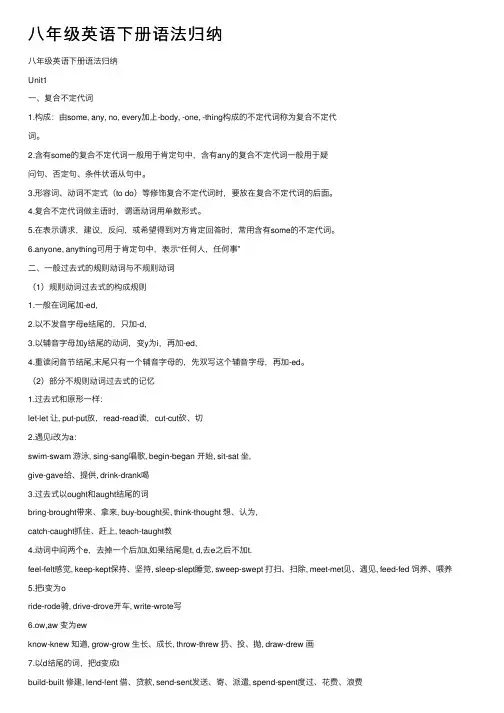
⼋年级英语下册语法归纳⼋年级英语下册语法归纳Unit1⼀、复合不定代词1.构成:由some, any, no, every加上-body, -one, -thing构成的不定代词称为复合不定代词。
2.含有some的复合不定代词⼀般⽤于肯定句中,含有any的复合不定代词⼀般⽤于疑问句、否定句、条件状语从句中。
3.形容词、动词不定式(to do)等修饰复合不定代词时,要放在复合不定代词的后⾯。
4.复合不定代词做主语时,谓语动词⽤单数形式。
5.在表⽰请求,建议,反问,或希望得到对⽅肯定回答时,常⽤含有some的不定代词。
6.anyone, anything可⽤于肯定句中,表⽰“任何⼈,任何事”⼆、⼀般过去式的规则动词与不规则动词(1)规则动词过去式的构成规则1.⼀般在词尾加-ed,2.以不发⾳字母e结尾的,只加-d,3.以辅⾳字母加y结尾的动词,变y为i,再加-ed,4.重读闭⾳节结尾,末尾只有⼀个辅⾳字母的,先双写这个辅⾳字母,再加-ed。
(2)部分不规则动词过去式的记忆1.过去式和原形⼀样:let-let 让, put-put放,read-read读,cut-cut砍、切2.遇见i改为a:swim-swam 游泳, sing-sang唱歌, begin-began 开始, sit-sat 坐,give-gave给、提供, drink-drank喝3.过去式以ought和aught结尾的词bring-brought带来、拿来, buy-bought买, think-thought 想、认为,catch-caught抓住、赶上, teach-taught教4.动词中间两个e,去掉⼀个后加t,如果结尾是t, d,去e之后不加t.feel-felt感觉, keep-kept保持、坚持, sleep-slept睡觉, sweep-swept 打扫、扫除, meet-met见、遇见, feed-fed 饲养、喂养5.把i变为oride-rode骑, drive-drove开车, write-wrote写6.ow,aw 变为ewknow-knew 知道, grow-grow ⽣长、成长, throw-threw 扔、投、抛, draw-drew 画7.以d结尾的词,把d变成tbuild-built 修建, lend-lent 借、贷款, send-sent发送、寄、派遣, spend-spent度过、花费、浪费Unit2频度副词1.表⽰次数、频率的副词称为频度副词。
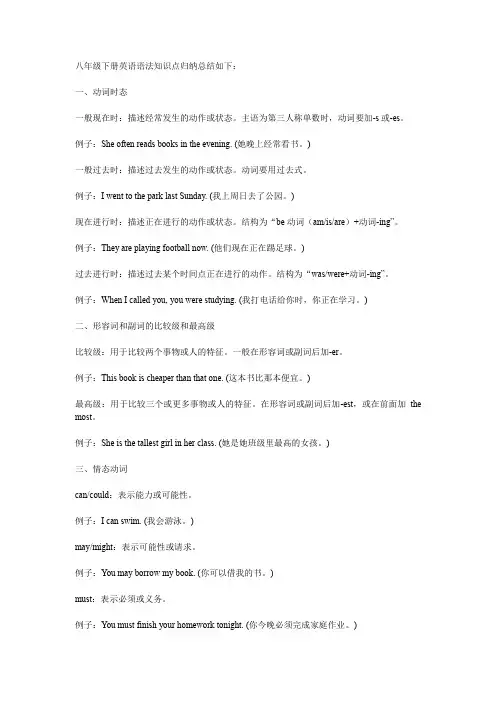
八年级下册英语语法知识点归纳总结如下:一、动词时态一般现在时:描述经常发生的动作或状态。
主语为第三人称单数时,动词要加-s或-es。
例子:She often reads books in the evening. (她晚上经常看书。
)一般过去时:描述过去发生的动作或状态。
动词要用过去式。
例子:I went to the park last Sunday. (我上周日去了公园。
)现在进行时:描述正在进行的动作或状态。
结构为“be动词(am/is/are)+动词-ing”。
例子:They are playing football now. (他们现在正在踢足球。
)过去进行时:描述过去某个时间点正在进行的动作。
结构为“was/were+动词-ing”。
例子:When I called you, you were studying. (我打电话给你时,你正在学习。
)二、形容词和副词的比较级和最高级比较级:用于比较两个事物或人的特征。
一般在形容词或副词后加-er。
例子:This book is cheaper than that one. (这本书比那本便宜。
)最高级:用于比较三个或更多事物或人的特征。
在形容词或副词后加-est,或在前面加the most。
例子:She is the tallest girl in her class. (她是她班级里最高的女孩。
)三、情态动词can/could:表示能力或可能性。
例子:I can swim. (我会游泳。
)may/might:表示可能性或请求。
例子:You may borrow my book. (你可以借我的书。
)must:表示必须或义务。
例子:You must finish your homework tonight. (你今晚必须完成家庭作业。
)四、被动语态被动语态用于描述事物的状态或描述被动发生的动作。
结构为“be动词(am/is/are/was/were)+动词的过去分词”。
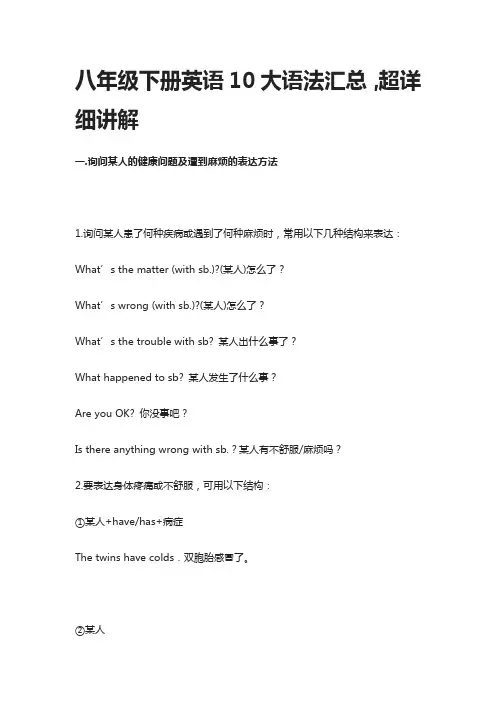
八年级下册英语10大语法汇总,超详细讲解一.询问某人的健康问题及遭到麻烦的表达方法1.询问某人患了何种疾病或遇到了何种麻烦时,常用以下几种结构来表达:What’s the matter (with sb.)?(某人)怎么了?What’s wrong (with sb.)?(某人)怎么了?What’s the trouble with sb? 某人出什么事了?What happened to sb? 某人发生了什么事?Are you OK? 你没事吧?Is there anything wrong with sb.?某人有不舒服/麻烦吗?2.要表达身体疼痛或不舒服,可用以下结构:①某人+have/has+病症The twins have colds.双胞胎感冒了。
②某人+have/has+a+headache/toothache/stomachache/backache/earache. She had a stomachache last night.她昨晚肚子痛。
③某人+have/has+a+sore+发病部位He has a sore throat.他喉咙痛。
④某人+hurt(s)+身体部位或反身代词He hurt his leg.他的腿受伤了。
⑤某部位+hurt(s).My head hurts badly.我头痛得厉害。
⑥某人+have/has+a pain+in one’s+身体部位I have a pain in my chest.我胸口痛。
⑦(There is) something wrong with one’s+身体部位There is something wrong with my right eye.我的右眼有毛病。
⑧其他表达方式She has a heart trouble.她有心脏病。
He got hit on the head.他头部受到了撞击。
She cut her finger.她割破手指了。
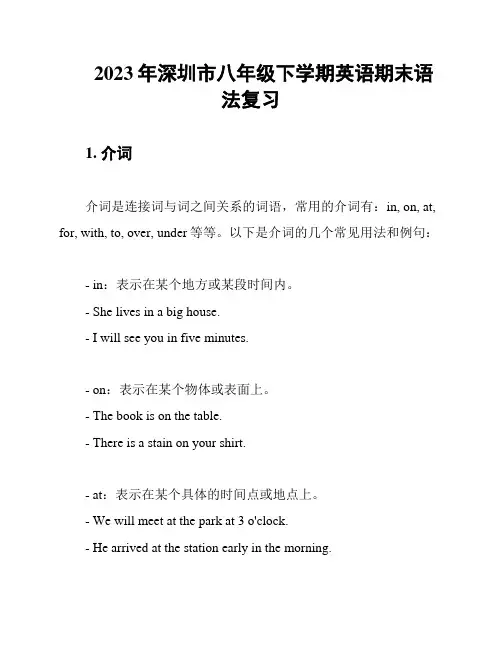
2023年深圳市八年级下学期英语期末语法复习1. 介词介词是连接词与词之间关系的词语,常用的介词有:in, on, at, for, with, to, over, under等等。
以下是介词的几个常见用法和例句:- in:表示在某个地方或某段时间内。
- She lives in a big house.- I will see you in five minutes.- on:表示在某个物体或表面上。
- The book is on the table.- There is a stain on your shirt.- at:表示在某个具体的时间点或地点上。
- We will meet at the park at 3 o'clock.- He arrived at the station early in the morning.2. 动词时态动词时态表示动作发生的时间,常见的时态有:一般现在时、一般过去时、一般将来时等。
以下是几个常用时态的用法和例句:- 一般现在时:表示经常或惯性的动作。
- I go to school every day.- She likes to read books.- 一般过去时:表示过去发生的动作或存在的状态。
- We visited our grandparents last weekend.- He studied hard for the exam.- 一般将来时:表示将来要发生的动作或存在的状态。
- They will go on a trip next month.- She is going to meet her friends tomorrow.3. 名词单复数名词用于表示人、物或概念,单数和复数形式有所区别。
以下是名词单复数的用法和例句:- 单数名词:表示一个人、一个事物或一个概念。
- I have a book.- She is a student.- 复数名词:表示多个人、多个事物或多个概念。
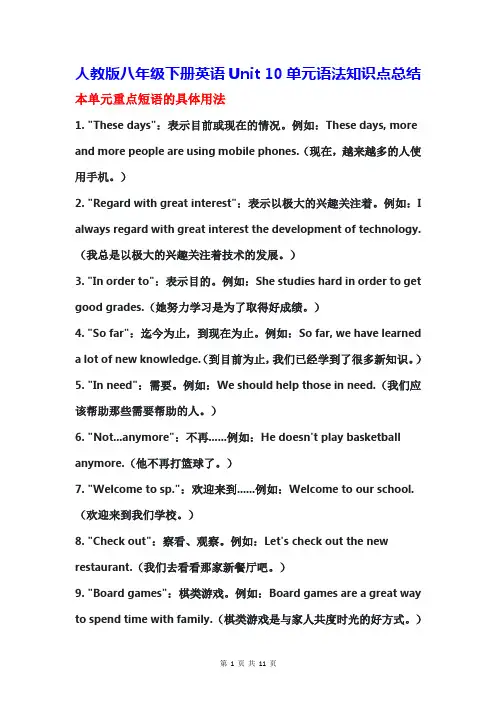
人教版八年级下册英语Unit 10单元语法知识点总结本单元重点短语的具体用法1. "These days":表示目前或现在的情况。
例如:These days, more and more people are using mobile phones.(现在,越来越多的人使用手机。
)2. "Regard with great interest":表示以极大的兴趣关注着。
例如:I always regard with great interest the development of technology.(我总是以极大的兴趣关注着技术的发展。
)3. "In order to":表示目的。
例如:She studies hard in order to get good grades.(她努力学习是为了取得好成绩。
)4. "So far":迄今为止,到现在为止。
例如:So far, we have learneda lot of new knowledge.(到目前为止,我们已经学到了很多新知识。
)5. "In need":需要。
例如:We should help those in need.(我们应该帮助那些需要帮助的人。
)6. "Not...anymore":不再......例如:He doesn't play basketball anymore.(他不再打篮球了。
)7. "Welcome to sp.":欢迎来到......例如:Welcome to our school.(欢迎来到我们学校。
)8. "Check out":察看、观察。
例如:Let's check out the new restaurant.(我们去看看那家新餐厅吧。
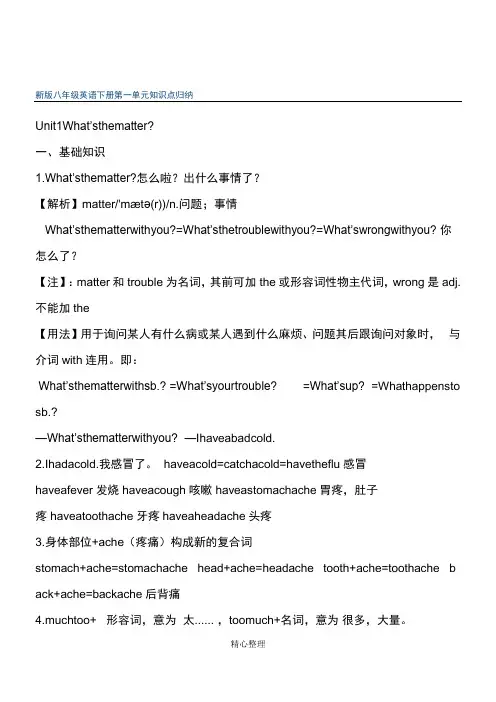
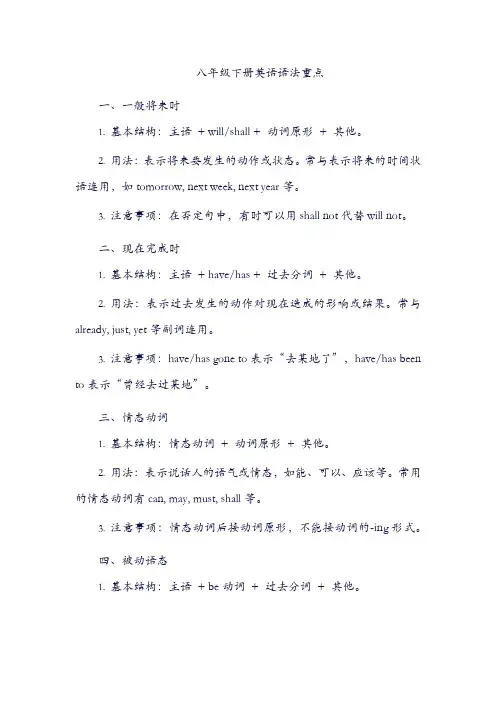
八年级下册英语语法重点一、一般将来时1.基本结构:主语+ will/shall + 动词原形+ 其他。
2.用法:表示将来要发生的动作或状态。
常与表示将来的时间状语连用,如tomorrow, next week, next year等。
3.注意事项:在否定句中,有时可以用shall not代替will not。
二、现在完成时1.基本结构:主语+ have/has + 过去分词+ 其他。
2.用法:表示过去发生的动作对现在造成的影响或结果。
常与already, just, yet等副词连用。
3.注意事项:have/has gone to表示“去某地了”,have/has been to表示“曾经去过某地”。
三、情态动词1.基本结构:情态动词+ 动词原形+ 其他。
2.用法:表示说话人的语气或情态,如能、可以、应该等。
常用的情态动词有can, may, must, shall等。
3.注意事项:情态动词后接动词原形,不能接动词的-ing形式。
四、被动语态1.基本结构:主语+ be动词+ 过去分词+ 其他。
2.用法:表示主语是动作的接受者。
常与by引导的方式状语连用,如by machine, by air等。
3.注意事项:被动语态的时态变化主要通过be动词的变化来实现,不同时态的被动语态需要注意与该时态的主动语态相对应。
五、不定代词和冠词用法1.不定代词:表示泛指或不确定的代词,如some, any, other等。
some用于肯定句,any用于否定句或疑问句;other表示“其他的”。
2.冠词:表示特指或泛指的词,分为定冠词the和不定冠词a/an。
a用于辅音音素开头的单词前,an用于元音音素开头的单词前;the 表示特指或上文提到的某个名词。
3.用法:不定代词和冠词一起使用时,可以构成限定词短语,如some books, the school gate等。
限定词短语可以修饰名词,表示特指或泛指的概念。
4.注意事项:在英语中,不定代词和冠词的使用是有规则和限制的,需要根据上下文和语境来判断使用哪个代词或冠词。
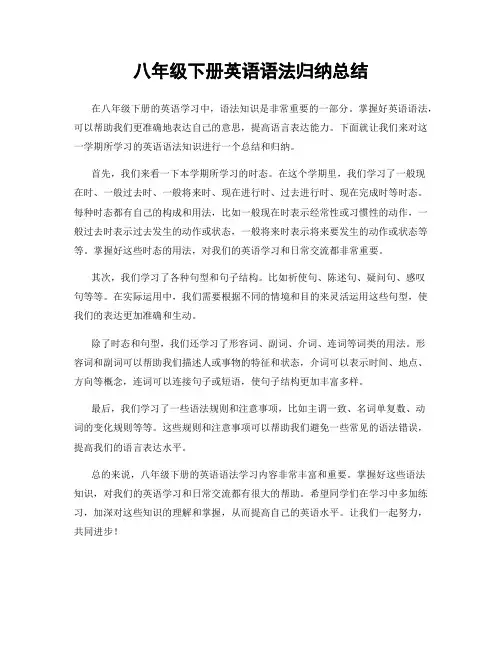
八年级下册英语语法归纳总结
在八年级下册的英语学习中,语法知识是非常重要的一部分。
掌握好英语语法,可以帮助我们更准确地表达自己的意思,提高语言表达能力。
下面就让我们来对这一学期所学习的英语语法知识进行一个总结和归纳。
首先,我们来看一下本学期所学习的时态。
在这个学期里,我们学习了一般现
在时、一般过去时、一般将来时、现在进行时、过去进行时、现在完成时等时态。
每种时态都有自己的构成和用法,比如一般现在时表示经常性或习惯性的动作,一般过去时表示过去发生的动作或状态,一般将来时表示将来要发生的动作或状态等等。
掌握好这些时态的用法,对我们的英语学习和日常交流都非常重要。
其次,我们学习了各种句型和句子结构。
比如祈使句、陈述句、疑问句、感叹
句等等。
在实际运用中,我们需要根据不同的情境和目的来灵活运用这些句型,使我们的表达更加准确和生动。
除了时态和句型,我们还学习了形容词、副词、介词、连词等词类的用法。
形
容词和副词可以帮助我们描述人或事物的特征和状态,介词可以表示时间、地点、方向等概念,连词可以连接句子或短语,使句子结构更加丰富多样。
最后,我们学习了一些语法规则和注意事项,比如主谓一致、名词单复数、动
词的变化规则等等。
这些规则和注意事项可以帮助我们避免一些常见的语法错误,提高我们的语言表达水平。
总的来说,八年级下册的英语语法学习内容非常丰富和重要。
掌握好这些语法
知识,对我们的英语学习和日常交流都有很大的帮助。
希望同学们在学习中多加练习,加深对这些知识的理解和掌握,从而提高自己的英语水平。
让我们一起努力,共同进步!。
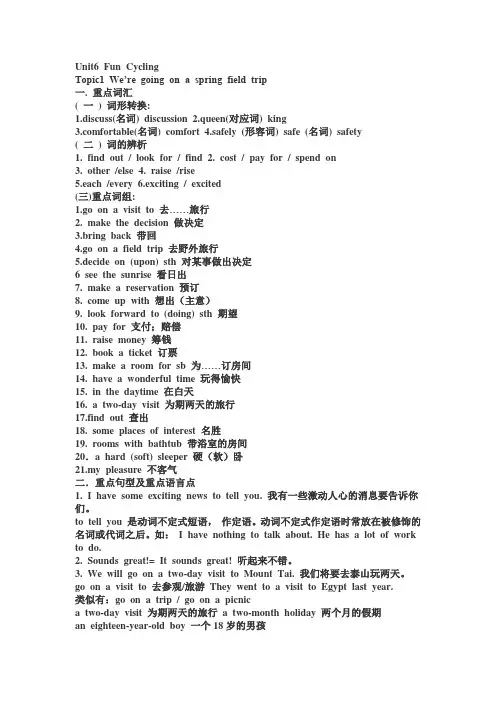
Unit6 Fun CyclingTopic1 We’re going on a spring field trip一. 重点词汇( 一) 词形转换:1.discuss(名词) discussion2.queen(对应词) kingfortable(名词) comfort4.safely (形容词) safe (名词) safety( 二) 词的辨析1. find out / look for / find2. cost / pay for / spend on3. other /else4. raise /rise5.each /every6.exciting / excited(三)重点词组:1.go on a visit to 去……旅行2. make the decision 做决定3.bring back 带回4.go on a field trip 去野外旅行5.decide on (upon) sth 对某事做出决定6 see the sunrise 看日出7. make a reservation 预订8. come up with 想出(主意)9. look forward to (doing) sth 期望10. pay for 支付;赔偿11. raise money 筹钱12. book a ticket 订票13. make a room for sb 为……订房间14. have a wonderful time 玩得愉快15. in the daytime 在白天16. a two-day visit 为期两天的旅行17.find out 查出18. some places of interest 名胜19. rooms with bathtub 带浴室的房间20.a hard (soft) sleeper 硬(软)卧21.my pleasure 不客气二.重点句型及重点语言点1. I have some exciting news to tell you. 我有一些激动人心的消息要告诉你们。
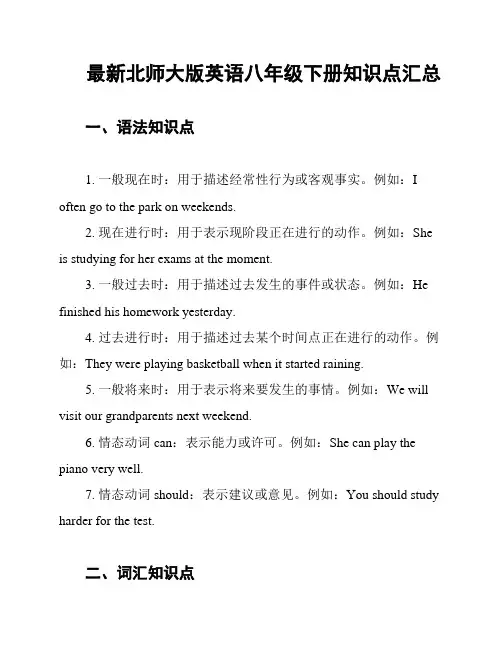
最新北师大版英语八年级下册知识点汇总一、语法知识点1. 一般现在时:用于描述经常性行为或客观事实。
例如:I often go to the park on weekends.2. 现在进行时:用于表示现阶段正在进行的动作。
例如:She is studying for her exams at the moment.3. 一般过去时:用于描述过去发生的事件或状态。
例如:He finished his homework yesterday.4. 过去进行时:用于描述过去某个时间点正在进行的动作。
例如:They were playing basketball when it started raining.5. 一般将来时:用于表示将来要发生的事情。
例如:We will visit our grandparents next weekend.6. 情态动词 can:表示能力或许可。
例如:She can play the piano very well.7. 情态动词 should:表示建议或意见。
例如:You should study harder for the test.二、词汇知识点1. 动物类词汇:例如cat(猫)、dog(狗)、elephant(大象)、tiger(老虎)等。
2. 学科类词汇:例如mathematics(数学)、science(科学)、history(历史)、English(英语)等。
3. 蔬菜类词汇:例如carrot(胡萝卜)、tomato(西红柿)、cabbage(卷心菜)、potato(土豆)等。
4. 家庭类词汇:例如father(父亲)、mother(母亲)、brother(兄弟)、sister(姐妹)等。
5. 地点类词汇:例如park(公园)、school(学校)、hospital (医院)、restaurant(餐厅)等。
三、阅读技巧1. 浏览标题和副标题,了解文章的大致内容。
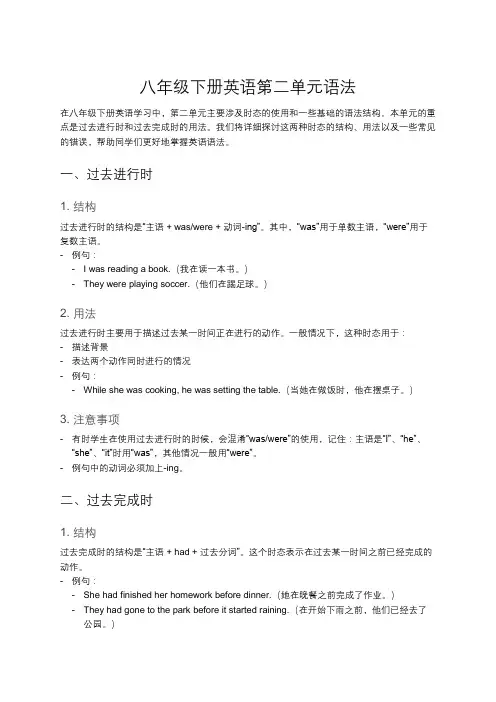
八年级下册英语第二单元语法在八年级下册英语学习中,第二单元主要涉及时态的使用和一些基础的语法结构。
本单元的重点是过去进行时和过去完成时的用法。
我们将详细探讨这两种时态的结构、用法以及一些常见的错误,帮助同学们更好地掌握英语语法。
一、过去进行时1. 结构过去进行时的结构是“主语 + was/were + 动词-ing”。
其中,“was”用于单数主语,“were”用于复数主语。
- 例句:- I was reading a book.(我在读一本书。
)- They were playing soccer.(他们在踢足球。
)2. 用法过去进行时主要用于描述过去某一时间正在进行的动作。
一般情况下,这种时态用于:- 描述背景- 表达两个动作同时进行的情况- 例句:- While she was cooking, he was setting the table.(当她在做饭时,他在摆桌子。
)3. 注意事项- 有时学生在使用过去进行时的时候,会混淆“was/were”的使用,记住:主语是“I”、“he”、“she”、“it”时用“was”,其他情况一般用“were”。
- 例句中的动词必须加上-ing。
二、过去完成时1. 结构过去完成时的结构是“主语 + had + 过去分词”。
这个时态表示在过去某一时间之前已经完成的动作。
- 例句:- She had finished her homework before dinner.(她在晚餐之前完成了作业。
)- They had gone to the park before it started raining.(在开始下雨之前,他们已经去了公园。
)2. 用法过去完成时主要用于以下几种情况:- 表示一个动作在另一个过去的动作之前完成- 描述过去时切换时需要强调的背景信息- 例句:- After he had left, I realized I had forgotten my book.(在他离开之后,我意识到我忘了我的书。
八年级下册英语复合句语法知识点归纳总结复合句是由两个或更多的句子组成的句子。
下面是八年级下册英语复合句的一些常见语法知识点总结:1. 关系代词关系代词用来引导定语从句,常见的关系代词有:who, whom, whose, which, that。
关系代词在从句中作为主语、宾语、或定语。
例句:- The girl who is wearing a red dress is my sister.- This is the book that I borrowed from the library.2. 定语从句定语从句用来修饰名词或代词,给出更多的信息。
定语从句通常用关系代词引导。
例句:- The house where he was born is now a museum.3. 时间状语从句时间状语从句用来表示时间,通常由when, while, before, after, since, until等引导。
例句:- I will visit my grandparents when I have time.4. 原因状语从句原因状语从句用来表示原因,通常由because, since, as等引导。
例句:5. 结果状语从句结果状语从句用来表示结果,通常由so, such...that, so that等引导。
例句:- The weather was so cold that we couldn't go outside.6. 目的状语从句目的状语从句用来表示目的,通常由in order to, so as to等引导。
例句:- I study hard in order to pass the exam.7. 条件状语从句条件状语从句用来表示条件,通常由if, unless, as long as, provided that等引导。
例句:- If it rains, we will stay indoors.以上是八年级下册英语复合句的一些常见语法知识点。
八年级下英语基本句型及语法1.Kids will study at home on computers.表通过电脑、电视及广播等用介词on2.In ten years, I think I will be a reporter.In , after和later的区别in +时间段:与将来时连用He will be back in two hours.after +时间段:与过去时连用He came back after two hours.after +时间点:可与将来时连用He will be back after two o\'clock.later只能接在时间段之后,即可用于过去时也可用于将来时。
Some days later, he become well again.I will go back two days later.3. On the weekend, I will be able to dress more cusually.can , be able to.1)can表示“能力”时,和be able to相当,许多场合都可以互相替换。
但当叙述过去经过一番努力才能完成的事情或前面有特殊说明,表示你有能力时,只能用be able to。
Can you speak any foreign languages?=Are you able to speak any foreign languages?2).can 只能用于一般现在时和一般过去时,而be able to可用于各种时态。
No one could / was able to answer this question.When he grows up, he will be able to support his family.他长大后就能养家了。
Frank is ill. He hasn't been able to go to school for one week. 弗兰克病了,已经一周没去上学了。
人教版八年级下册英语Unit 5单元语法知识点总结本单元重点短语的具体用法1. make sure:确信;确认。
例如:Make sure you lock the door before you leave.(在你离开之前,确保锁好门。
)2. beat against...:拍打……。
例如:The waves were beating against the shore.(波浪拍打着海岸。
)3. fall asleep:进入梦乡;睡着。
例如:I fell asleep while watching TV.(我看电视时睡着了。
)4. die down:逐渐变弱;逐渐消失。
例如:The fire died down after the firefighters arrived.(消防员到达后,火逐渐熄灭了。
)5. wake up:醒来。
例如:I usually wake up at 7 o'clock in the morning.(我通常早上7 点醒来。
)6. in a mess:一团糟。
例如:The room is in a mess.(房间一团糟。
)7. break...apart:使……分离。
例如:The police had to break the door apart to enter the room.(警察不得不破门而入进入房间。
)8. in times of difficulty:在困难的时候。
例如:We should help each other in times of difficulty.(在困难的时候,我们应该互相帮助。
)9. at the time of:当……时候。
例如:At the time of the accident, I was sleeping.(在事故发生时,我正在睡觉。
)10. go off:(闹钟)发出响声。
例如:The alarm went off at 6 o'clock.(闹钟在6 点钟响了。
英语八年级语法以下是八年级英语的一些语法、单词、短语相关内容:一、语法点:一般将来时(will + 动词原形)1. 英语释义:Used to talk about actions or events that will happen in the future.2. 短语:in the future(在将来)3. 单词:will(将,会)4. 用法:- 表示将来某个时间要发生的动作或存在的状态。
- 可以用于各种人称(I, you, he, she, it, we, they)。
5. 双语例句- I will go to school tomorrow.(我明天将去上学。
)- He will play football this weekend.(他这个周末将踢足球。
)二、语法点:形容词比较级和最高级(规则变化:一般在词尾加 -er/ -est;以不发音的e结尾加 -r/ -st;以重读闭音节结尾且末尾只有一个辅音字母,双写该辅音字母加 -er/ -est;以“辅音字母+y”结尾,把y变i加 -er/ -est)1. 英语释义:Comparative degree is used topare two things, and superlative degree is used topare more than two things.2. 短语:than(比)3. 单词:big - bigger - biggest(大的 - 更大的 - 最大的)4. 用法:- 比较级用于两者之间的比较,常与than连用。
- 最高级用于三者或三者以上的比较,前面一般要加the。
5. 双语例句- My book is bigger than yours.(我的书比你的大。
)- He is the tallest boy in our class.(他是我们班最高的男孩。
)三、语法点:现在进行时(be动词(am/is/are)+动词的 -ing形式)1. 英语释义:Used to describe an action that is happening at the present moment.2. 短语:at the moment(此刻)3. 单词:be动词(am/is/are),例如:is(是)4. 用法:- 表示此时此刻正在进行的动作或存在的状态。
八年级英语下册语法知识生命是短暂的,空余时间很少,因此我们不应把一刻空余时间耗费在阅读价值不大的书籍上。
下面给大家带来一些关于八年级英语下册语法知识,希望对大家有所帮助。
八年级英语下册语法1一般将来时态的应用do/does 的一般将来时态形式:(shall/will) dodo/does 的一般将来时态的被动语态:(shall/will) be done一般将来时态的肯定句、否定句、疑问句形式:肯定句例句:People will have robots in a few years.否定句例句:People (will not/won't) have robots in a few years.一般疑问句例句:Will people have robots in a few years?特殊疑问句例句:What will people have in a few years?八年级英语下册语法2过去将来时一、过去将来时的结构should/would+动词原形do/does 的过去将来时态形式:(should/would) dodo/does的过去将来时态的被动语态:(should/would) be done 过去将来时态的肯定句、否定句、疑问句形式:肯定句例句:You should write a letter to him.否定句例句:You shouldn't write a letter to him.一般疑问句例句:Should I write a letter to him?特殊疑问句例句:What should I do?八年级英语下册语法3过去进行时do/does 的过去进行时态形式:(was/were) doingdo/does 的过去进行时态的被动语态:(was/were) being done过去将来时态的肯定句、否定句和疑问句形式:肯定句例句:I was walking down the street when a UFO landed.否定句例句:I wasn't walking down the street when a UFO landed.一般疑问句例句:Were you walking down the street when a UFO landed?特殊疑问句例句:What were you doing when a UFO landed?动词 when 和 while 的选择:when 后加瞬间动词,while 后加延续性动词。
If和unless的用法If的用法:1. (表示条件)如果,例如:He will come if you invite him.2. (表示虚拟)假如,要是例如:If they were here, they would help you.If she had worked harder, she would have succeeded.If you succeeded, everything would be all right.3. 是否= whether 连接宾语从句unless的用法:unless 是从属连词,常用来引导一个条件状语从句, 由于其本身具有否定的意义,所以其引导的从句就不再用否定词了.另外, unless引导的条件状语从句仍像if引导的条件句那样,用一般现在时表示将来.例如:I'll not go there unless I'm invited. 除非受到邀请,要不然我就不去那儿。
它们的区别在于:1、不能用and连接两个unless从句,即不能用…unless…,and unless…。
但if…not and if…not却不受此限。
2、unless不可用于虚拟条件,if则可以。
形容词的用法一、形容词(组)用作状语,常常表示伴随情况。
可以放在句首,也可放在句末。
例如:1.Over joyed,they rushed to the front. ——他们非常高兴,急忙跑到前面。
2.The thief hid himsel finthe corner,afraid of being caught.——小偷躲在角落里,担心被人抓住。
二、形容词(组)用作原因状语,通常位于句首。
例如:1.As he was thirsty and eager to get a little rest,he went into the tea house and seated himself at a little table by the window.由于口渴,又渴望休息片刻,他就走进茶馆,在靠窗的一张小桌旁坐下。
2.Easy to be with,he is warmly welcomed.——因为平易近人,所以他受到热烈欢迎。
三、形容词(组)用作结果状语,一般位于句末。
例如:1.They broke into the uncle‟s bedro om and found the man lying on the floor,dead.他们强行冲进叔叔的卧室,发现那个人躺在地板上,已经死了。
2.He returned from war,safe and sound.——他安然无恙地从战争中归来。
四、形容词(组)用作评注性状语,表示说话人的看法、态度和评价。
通常位于句首,常用逗号与句子隔开。
例如:1.Even more important,he is in charge of the project.——更重要的是,他负责这项工程。
2.Curious,the game should turn out that way.——真奇怪,比赛结果是那样的。
五、形容词(组)用作让步状语,常由一个形容词短语或or连接的两个以上的并列形容词短语构成。
常常位于句首也可位于句中。
例如:1. Old or young, the peasants are busy with autumn harvest.——农民不论老少都在忙于秋收。
2. Every nation, big or small, should be equal.——每个国家无论大小,都应一律平等。
3. Right or wrong, I‟ll stand on your side.——无论对还是错,我都将站在你的一边。
六、形容词(组)还可以用作时间状语。
例如:1.Glad, I sing an English song. (=When I am glad, I sing an English song.)我高兴的时候,就唱一首英语歌。
2.We don‟t eat vegertables raw. (=When vegetables are raw, we don‟t eat them.)我们不吃生蔬菜。
、特殊疑问词Why的用法用疑问词引导的疑问句叫做特殊疑问句。
why引导的疑问句:询问原因它的回答只能用because引导的原因状语从句。
Why are you late?你为什么迟到?Because I met the accident. 因为我遇上车祸了。
Why didn't you see the movie?你为什么不去看电影?=Why did you not see the movie?Because I had seen it before. 因为我已经看过了。
比较1(not) as …as 表示在某一点上两事物(不)相同as…as 之间必须用形容词或副词的原级I’m not as tall as my brother.Eric studies as hard as his twin sister.2like (介词)用于说明两事物在一个或更多的方面相同.like+名词或代词as也表示像的意思,但as 后接从句The boy looks like his father.I’ll do as you advise.3the same as 用于说明某事物与另一个一样.I’m not the same height as my brother.We have lived in this same house for thirty years.same 前面必须有定冠词the,后加单数名词different 正好相反,前面不用加the,后面用复数名词We study in the same school, but in different classes.There are different books on the same subject.Note: 但也可以说a different 加单数名词This is a different girl from the one I saw just now.•different from用于说某事物和另一个不一样.The dog is different from the other.* 很多情况下, not as… as, not the same as和different from之间可以互换.I’m not as heavy as him.=I’m not the same weight as him.=My weight is different from his.More practice about language.Ask students to do exercises on work book on page 31.After it , check the answers.Post-task ActivitiesAsk the students to sum up.ConsolidationAsk students to tell something about Green Consumer.目的状语从句:从句部分是用以补充说明主句中谓语动词发生的目的的。
表示目的状语的从句可以由that, so that, in order that, lest, for fear that, in case等词引导;目的状语从句的谓语常含有may, might, can, could, should, would等情态动词。
例如:You must speak louder so that /in order that you can be heard by all.He wrote the name down for fear that(lest) he should forget it.Better take more clothes in case the weather is cold.引导目的状语从句常用的连词有:that(以便),so that(以便),in order that(为了;以便),Lest(免得;唯恐),for fear that(生怕;以免)。
【例如】Say it louder(so)that everyone can hear you.大声说,以便大家都能听到你。
I am telling you that lest you should make a mistake.我告诉你这一点,以免你搞错。
学习目的状语从句应注意以下两点:(1)目的状语从句中常含有can,could,may,might,should等情态动词。
【例】I got up early so that I could catch the first bus.我起得很早,目的是为了赶上头班公共汽车。
(2)在口语中so可以引导目的状语从句。
【例】We'll sit nearer the front so we can hear better.我们坐的靠前一点,因此,我们听得清楚一点。
【注意】in order that与in order to的区别:in order that+从句in order to+动词原形(in order to后面加的那个不叫目的状语从句,叫目的状语)目的状语从句的一个特点:由于目的都是未来的行为,所以从句中一般用表示未来可能性时态,比如上面两句中的could。
当然还可以用will,would,can,等结果状语从句的连词以下结果状语从句的一些用法。
1) so … that…/ such ….that该句式中重要考查的是so和such的区别。
应注意以下可能出现的结构:so nice a boy that…such a nice boy that…so beautiful/diligent/carefully … that…such (fine weather/great improvement) that…2) so thatEveryone lend a hand, so that the sowing was done in time.该句式中主要考查so that 与其它短语的区别,如:I took no notice of him, ___ he flew into a rage.A.for thatB.so thatC.in thatD.but that由于so that也可以引导目的状语从句,同学们应特别注意从句中时态的运用。